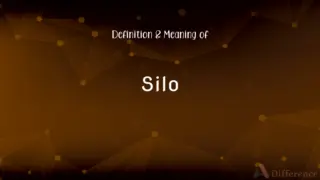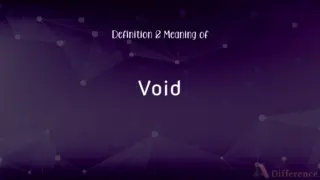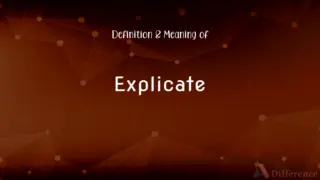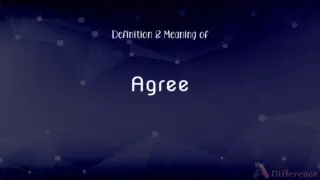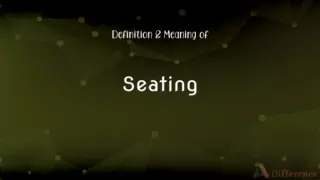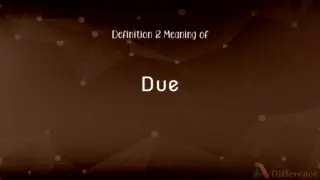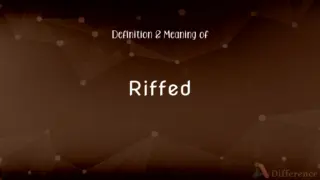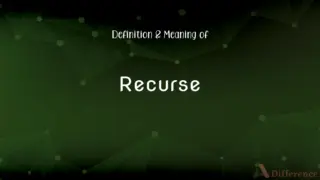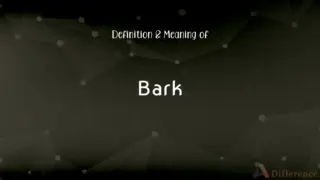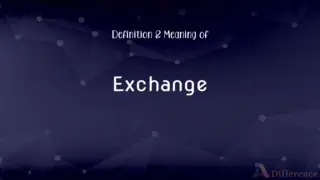Poetry Definition and Meaning
By Tayyaba Rehman & Fiza Rafique — Updated on March 5, 2024
Poetry is a form of literature that uses aesthetic and rhythmic qualities of language to evoke meanings in addition to, or in place of, the prosaic ostensible meaning. e.g., The student recited her favorite poetry piece with great emotion.
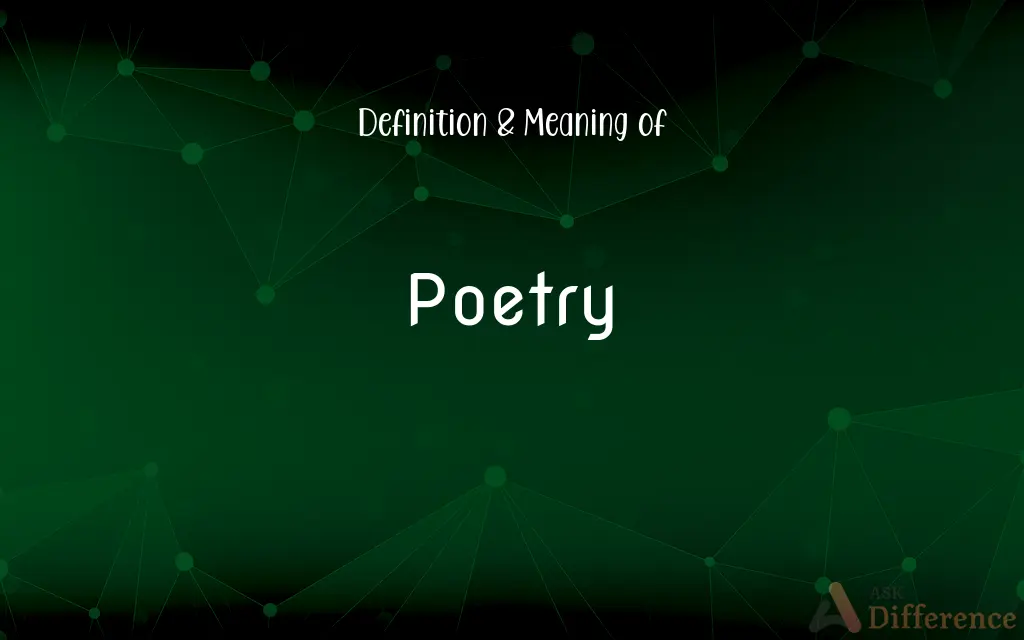
Table of Contents
Poetry Definitions
Literary work: Poetry is a literary work in verse, characterized by rhythm, meter, and often rhyme.
Shakespeare's poetry is celebrated for its beauty and depth.
Medium of reflection: Poetry serves as a medium for reflection, introspection, and commentary on the human condition.
Langston Hughes' poetry reflects on social injustices and dreams deferred.
Channel for emotions: Poetry is a channel for emotions, allowing both writer and reader to explore complex feelings.
Sylvia Plath's poetry is intensely emotional and personal.
Tool for education: It serves as a tool for education, teaching language, history, and empathy.
Children's poetry often includes lessons on morality and behavior.
Art of expression: It's the art of expressing feelings, thoughts, and ideas through the creative arrangement of words.
Through her poetry, Maya Angelou gave voice to the voiceless.
Expression of culture: It is an expression of culture, capturing and preserving the experiences of a community.
Ancient Greek poetry tells us much about their gods and societal values.
Instrument of change: Poetry can be an instrument of change, inspiring action and influencing society.
The poetry of the Beat Generation challenged norms and inspired cultural shifts.
Verbal creativity: Poetry is verbal creativity that emphasizes sound, imagery, and the power of meaning.
Modern poetry often breaks traditional forms to explore new expressions.
Form of verse: It is a structured form of verse, using meter and sometimes rhyme schemes.
The sonnet is a popular poetry form with strict structure.
Form of entertainment: Historically, poetry was also a form of entertainment, told orally to captivate audiences.
Epic poetry like Homer's Odyssey was originally performed for entertainment.
The act or practice of composing poems.
Poems regarded as forming a division of literature.
The poetic works of a given author, group, nation, or kind.
Literature written in meter; verse.
Prose that resembles a poem in some respect, as in vivid imagery or rhythmic sound.
The essence or characteristic quality of a poem
"It is impossible to separate the 'poetry' in Paradise Lost from the peculiar doctrines that it enshrines" (T.S. Eliot).
A quality that suggests poetry, as in grace, beauty, or harmony
The poetry of the dancer's movements.
Literature composed in verse or language exhibiting conscious attention to patterns and rhythm.
A poet's literary production.
(figurative) An artistic quality that appeals to or evokes the emotions, in any medium; something having such a quality.
That 'Swan Lake' choreography is poetry in motion, fitting the musical poetry of Tchaikovski's divine score well beyond the literary inspiration.
The art of apprehending and interpreting ideas by the faculty of imagination; the art of idealizing in thought and in expression.
For poetry is the blossom and the fragrance of all human knowledge, human thoughts, human passions, emotions, language.
Imaginative language or composition, whether expressed rhythmically or in prose. Specifically: Metrical composition; verse; rhyme; poems collectively; as, heroic poetry; dramatic poetry; lyric or Pindaric poetry.
She taketh most delightIn music, instruments, and poetry.
Literature in metrical form
Any communication resembling poetry in beauty or the evocation of feeling
Poetry Snonyms
Ode
A form of poetry meant to be sung or praised.
The ode to the fallen heroes was deeply moving.
Verse
Written lines of rhythm and meter; often used interchangeably with poetry.
The book's verse brought the ancient stories to life.
Prose
Written or spoken language in its ordinary form, without the structured meter of poetry.
Though she usually wrote prose, she appreciated the concise beauty of poetry.
Haiku
A form of poetry with a specific syllable count, originating from Japan.
She expressed her love for spring in a delicate haiku.
Epic
A long, narrative poem about heroic deeds and events of historical or legendary importance.
The epic tales of mythology have inspired countless other works of art.
Narrative
Poetry that tells a story with characters and a plot.
Narrative poetry often combines the art of storytelling with poetic beauty.
Sonnet
A specific form of poetry with a distinct structure and rhyme scheme.
He challenged himself to write a sonnet every day for a month.
Lyric
Poetry that expresses personal and emotional feelings.
Her collection of lyric poetry resonated with many.
Ballad
A type of poetry that tells a story, often in a musical rhythm.
The ballad of the ancient mariner is still popular in literature classes.
Elegy
A mournful, melancholic poetry, especially one lamenting the dead.
The elegy for the poet was as beautiful as it was sad.
Poetry Idioms & Phrases
Life's poetry
The natural, often unnoticed beauty and rhythm in everyday life.
Watching the sunset over the ocean is life's poetry.
Poetry of the heart
Deep, heartfelt emotions expressed genuinely and passionately.
His letter to her was pure poetry of the heart.
Finding poetry in the prosaic
Discovering beauty or profound meaning in everyday, mundane things.
He finds poetry in the prosaic life of the small town.
A world without poetry
A dull, uninspired existence lacking creativity or beauty.
A world without poetry would be like a garden without flowers.
The poetry of the earth
The natural beauty and sounds of the world around us.
The birdsong at dawn is the poetry of the earth.
Writing poetry with one's life
Living in a way that creates beauty and inspiration for others.
She lived her life helping others, writing poetry with her actions.
Poetry in motion
Something or someone that moves in a way that is as beautiful or graceful as a poem.
The dancer was poetry in motion on the stage.
The poetry of silence
The profound or eloquent quality that silence can have.
In the quiet of the night, there was a certain poetry of silence.
Poetry of the soul
The deep, emotional expression that comes from within one's innermost being.
Her music is not just sound; it's the poetry of the soul.
Turning life into poetry
Making one's life experiences and emotions into something beautiful and expressive.
Through his art, he turns his struggles into poetry.
The poetry in pain
Finding or expressing beauty, learning, or growth through suffering.
There's a certain poetry in pain that artists often explore.
Poetry under the stars
Experiencing or creating poetry in a beautiful, natural setting.
They shared their love for poetry under the stars, feeling connected to the universe.
The poetry of simplicity
The beauty and profundity found in simple things and moments.
There's a distinct poetry of simplicity in her writing style.
To speak in poetry
To express oneself in a highly artistic, emotive, or lyrical manner.
Whenever he spoke of his homeland, he would speak in poetry.
The poetry of the moment
The unique beauty or significance of a particular moment in time.
Their first kiss was the poetry of the moment, unforgettable and sweet.
Poetry of the streets
The vibrant, often overlooked stories and beauty found in urban life.
His photographs capture the poetry of the streets.
The poetry of everyday life
Finding or recognizing the lyrical and beautiful aspects in daily routines.
She writes about the poetry of everyday life in her blog.
Poetry in the air
A feeling or atmosphere charged with emotion, creativity, or anticipation.
On the eve of the festival, there was poetry in the air.
Creating poetry in the kitchen
The art of cooking with passion, creativity, and love, turning food into an expression of beauty.
She loves creating poetry in the kitchen, making each dish a masterpiece.
The poetry of friendship
The deep and meaningful connections that form between friends, likened to the beauty and depth of poetry.
Their long-standing bond was the poetry of friendship, full of shared memories and understanding.
Poetry Example Sentences
I found a book of poetry from the 19th century in the attic.
She prefers poetry that rhymes and has a clear rhythm.
In class, we analyzed the symbolism used in the poetry of Robert Frost.
He writes poetry to cope with his feelings of loneliness.
The poetry festival celebrates both established and emerging poets.
The imagery in that poetry painted a vivid picture in my mind.
Our teacher explained the different types of poetry, including haiku and sonnet.
The poetry slam competition showcased talented young poets.
The library held a poetry reading event for local authors.
Many musicians consider their song lyrics to be a form of poetry.
Writing poetry helps me express thoughts I can't easily say out loud.
Ancient poetry often contained lessons and moral stories.
Poetry can be found in many cultures around the world.
He used poetry to critique societal issues and injustices.
Common Curiosities
Why is it called poetry?
Poetry comes from the Greek word "poiesis," meaning making or creating, reflecting its creative and expressive nature.
How many syllables are in poetry?
Poetry has three syllables.
How is poetry used in a sentence?
Poetry can enhance our understanding of the world through its metaphorical language.
What is a stressed syllable in poetry?
The first syllable, "po," is the stressed syllable in poetry.
What is the verb form of poetry?
There is no direct verb form of "poetry," but "poetize" can be used to mean the act of writing poetry.
How do we divide poetry into syllables?
Poetry is divided into syllables as po-et-ry.
What part of speech is poetry?
Poetry is a noun.
Is poetry a noun or adjective?
Poetry is a noun.
What is the pronunciation of poetry?
Poetry is pronounced as /ˈpoʊ.ɪ.tri/.
What is another term for poetry?
Verse is another term often used for poetry.
Is poetry an abstract noun?
Yes, poetry is an abstract noun.
Is poetry a countable noun?
Poetry is generally considered uncountable, but it can be countable when referring to specific works or types of poetry.
Is poetry a collective noun?
No, poetry is not typically classified as a collective noun.
Is the word poetry imperative?
No, poetry is not imperative; it is a noun.
Is the word “poetry” a Direct object or an Indirect object?
"Poetry" can serve as either, depending on its use in a sentence.
What is the singular form of poetry?
Poetry can be both singular and plural and does not change form.
Is the poetry term a metaphor?
The term itself is not a metaphor, but poetry often uses metaphors.
Is poetry an adverb?
No, poetry is not an adverb.
Is poetry a vowel or consonant?
The word "poetry" starts with a consonant.
Which determiner is used with poetry?
Determiners like "some" or "the" can be used with poetry, depending on context.
Which preposition is used with poetry?
Prepositions like "of," "in," and "about" are commonly used with poetry.
What is the root word of poetry?
The root word of poetry is the Greek "poiesis," meaning making or creating.
What is the plural form of poetry?
Poetry is used as both singular and plural; context determines its use.
What is the opposite of poetry?
Prose is often considered the opposite of poetry.
Is poetry a negative or positive word?
Poetry is neutral; its connotation depends on context.
Is the word poetry Gerund?
No, poetry is not a gerund; it is a simple noun.
Which vowel is used before poetry?
The vowel used before poetry depends on the preceding word in a sentence.
Which conjunction is used with poetry?
Conjunctions such as "and" or "but" can be used, depending on the sentence structure.
Which article is used with poetry?
Both "the" and "a" can be used with poetry, depending on the context.
Share Your Discovery
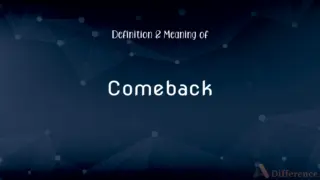
Previous Term
Comeback Definition and Meaning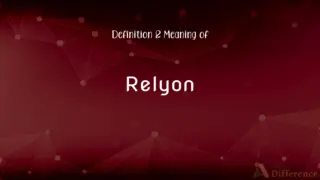
Next Term
Relyon Definition and MeaningAuthor Spotlight
Written by
Tayyaba RehmanTayyaba Rehman is a distinguished writer, currently serving as a primary contributor to askdifference.com. As a researcher in semantics and etymology, Tayyaba's passion for the complexity of languages and their distinctions has found a perfect home on the platform. Tayyaba delves into the intricacies of language, distinguishing between commonly confused words and phrases, thereby providing clarity for readers worldwide.
Co-written by
Fiza RafiqueFiza Rafique is a skilled content writer at AskDifference.com, where she meticulously refines and enhances written pieces. Drawing from her vast editorial expertise, Fiza ensures clarity, accuracy, and precision in every article. Passionate about language, she continually seeks to elevate the quality of content for readers worldwide.









